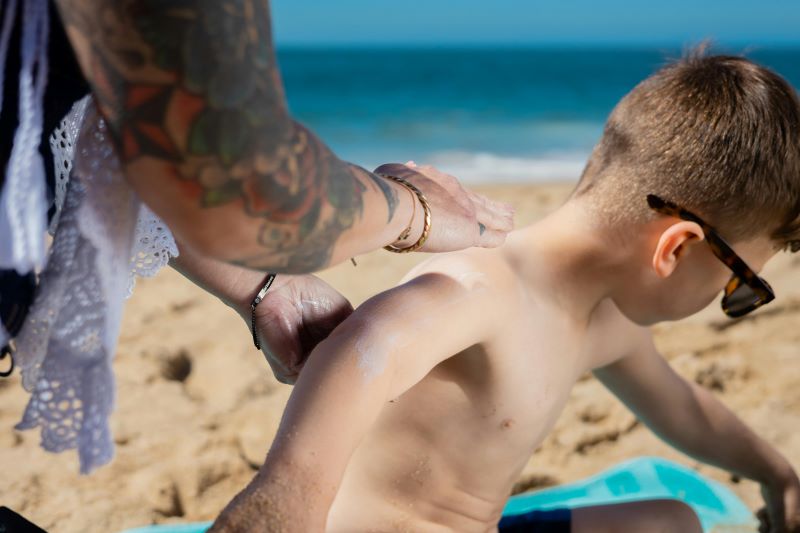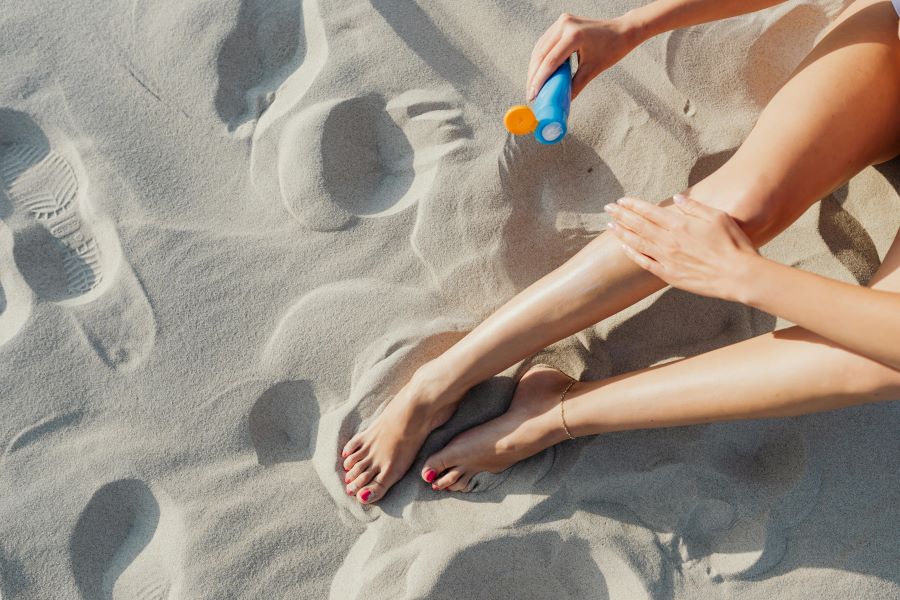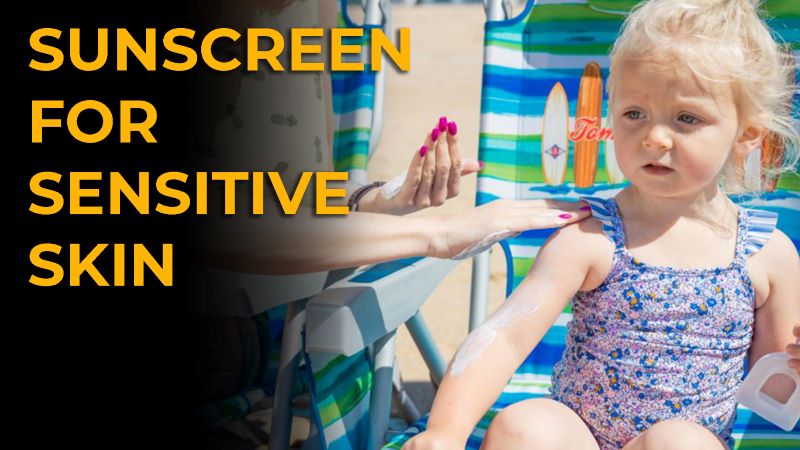When it comes to sunscreen for sensitive skin, finding the right one can feel like shopping for shoes with a pebble in your sock. Every formula promises comfort, but many end up irritating more than protecting. For those who break out in redness, rashes, or itching after a day in the sun, the journey to the right sunscreen is deeply personal—and often frustrating. This guide simplifies it all with friendly advice, real experiences, and practical tips.
What Makes Skin “Sensitive” in the Sun?
Sensitive skin reacts more intensely than average to everyday triggers, especially UV exposure. The sun may be warm and welcoming, but for those with reactive skin, it can bring along redness, stinging, or even hives. Many commercial sunscreens include ingredients like oxybenzone, fragrances, or preservatives that spark these reactions.
A friend once shared how her beach day turned into a nightmare. She’d picked a drugstore sunscreen that smelled like coconuts. After just one hour outside, her cheeks were red and sore. What she needed was a hypoallergenic sunscreen for sensitive skin, not one packed with synthetic scents.

Ingredients make or break a product. Zinc oxide and titanium dioxide are physical blockers known to be gentler and often found in unscented sunscreen for sensitive skin. These mineral sunscreens sit on top of the skin rather than absorbing into it, making them less likely to cause irritation. On the flip side, chemical sunscreens—especially those with avobenzone or octocrylene—can lead to breakouts and discomfort.
Sensitive skin doesn’t mean avoiding the sun completely—it means choosing protection wisely. It’s like bringing an umbrella when the sky looks moody.
Choosing the Best Sunscreen for Sensitive Skin
Picking the best sunscreen for sensitive skin is more than choosing SPF 50 and calling it a day. You’ve got to read the labels like you’re scanning ingredients on a snack for someone with allergies. Less is more. No dyes, no fragrance, no alcohol.
Mineral-based formulas are usually a smart and gentle choice. Take Vanicream, for example—it’s often recommended by dermatologists for its simple, no-fuss ingredients. It won’t sting your eyes or leave you with a rash, even if your skin tends to react to just about everything.
Here are a few features worth checking:
-
Broad Spectrum SPF protects against both UVA and UVB rays
-
Water Resistance is great for pool days or outdoor workouts
-
Non-comedogenic means it won’t clog your pores
-
Reef Safe matters when visiting places like Hawaii, where ocean life is protected
If you’re planning a beach trip or a tropical getaway, using a reef safe sunscreen for sensitive skin is a smart way to care for both your skin and the sea. It’s a simple habit that helps keep your glow—and the coral reefs—going strong.
Face Sunscreen for Sensitive Skin: Where Breakouts Begin
The face is often the first place to react when something doesn’t agree with your skin. Redness, itching, or burning? It could all come down to using the wrong sun protection. That’s why products made just for the face are worth the extra attention—because what works on your arms won’t always work on your cheeks.
Facial skin is much more delicate. A dermatologist once said it best: your face is like silk, while your arms are more like denim. They both need care, but not the same kind. That’s why it’s important to choose lightweight, mineral formulas designed specifically for the face.
Look for ones that are fragrance-free, non-greasy, and gentle enough for daily wear. Options like Neutrogena’s formulas are great—they’re soft on the skin, don’t clog pores, and offer solid protection. For a little extra coverage, tinted products are also available. These offer sun protection while evening out your skin tone—perfect for no-makeup days or simple morning routines. Using a trusted sunscreen for sensitive skin on your face keeps things calm, clear, and protected.
Baby and Kids: Extra Care for Little Ones
When it comes to sun care for little ones, the product you pick really matters. A baby’s skin is extra soft—like freshly made dough. It soaks things in easily and gets irritated fast. That’s why doctors often suggest using mineral-based products with SPF 30 or higher. They also recommend avoiding harsh stuff like parabens, dyes, or strong preservatives.

Imagine a toddler laughing at the beach, scooping sand and chasing waves. Now picture that fun ending with red, itchy skin because the sun care wasn’t gentle enough. Just because something says “baby” on the label doesn’t mean it’s safe for all babies.
To keep things simple, many parents choose options that are tear-free, fragrance-free, and approved by doctors. Brands like Vanicream and Thinkbaby are trusted for a reason. Their products don’t run into eyes or cause stinging, even during splashes and play. That way, the only thing turning red at the beach is a toy—not your child’s skin.
What About Tinted and Makeup-Friendly Options?
For many, sunscreen is part of a daily routine, like brushing your teeth. So having options that blend with makeup or replace it is a win-win. Best tinted sunscreen for sensitive skin products offer coverage without the heaviness of foundation.
They’re especially useful for people with rosacea or uneven tone—giving a smooth, natural look while still protecting from the sun. A tinted sunscreen also helps reduce white cast, which is a common issue with mineral sunscreens.
Some popular picks include versions with iron oxides, which add color and even help block visible light. For people living in hot, humid climates—like Dhaka or Bangkok—a lightweight tinted SPF makes walking outside feel less like a risk.
Sunscreen Shouldn’t Smell Like Perfume
Scented sunscreens may feel tropical, but for someone with reactive skin, it’s a minefield. Fragrances are one of the top causes of allergic reactions in skincare.

That’s why unscented sunscreen for sensitive skin is a go-to. These formulas skip added fragrance altogether, reducing the risk of inflammation. While some people enjoy coconut-scented SPF at the beach, for others it’s like rubbing on a rash.
Think of it like perfume in food—some love it, others break out in hives. Sticking to unscented, dermatologically tested products is safer and smarter for sensitive folks.
FAQ’s
-
What is the safest option for easily irritated skin?
The gentlest choices are usually mineral formulas made with zinc oxide or titanium dioxide. Trusted names like Vanicream and Neutrogena often come highly recommended. -
Can children use adult products if they’re labeled gentle?
Some adult formulas are safe for children, especially if they’re free of added scents and harsh ingredients. However, it’s best to use versions made specifically for babies or young kids. -
Are eco-friendly products also gentle on reactive skin?
Yes, many ocean-safe options are made with calming minerals and are free of common irritants, making them suitable for delicate skin as well. -
Why does my face burn when I apply sun protection?
That stinging feeling might come from ingredients like alcohol, fragrance, or certain chemical filters. Switching to a product with physical blockers can help reduce irritation. -
Is it okay to use a tinted formula daily?
Definitely. A lightly tinted option can double as a simple makeup substitute while offering sun protection and a subtle glow.
Final Thoughts: Making Sun Care Simple and Safe
Choosing the right sunscreen for sensitive skin is like picking the perfect cozy sweater—it should feel soft, protect well, and never leave you itchy. With so many types on the shelf, from mineral to fragrance-free, it can be hard to decide. But here’s something simple to remember: the best kind is the one you’ll actually use every single day.
If your skin flares up from sun, scents, or even soap, you know how tough it is to find something that won’t cause a rash or breakouts. That’s why it helps to choose formulas that are light, gentle, and made without strong chemicals. You might like baby-safe ones, trusted brands like Vanicream, or anything labeled “hypoallergenic.” The goal is always the same—to protect your skin without making it upset.
Think of sunscreen as a little act of care. Like drinking water or grabbing a scarf when it’s cold, using the right kind helps you enjoy the sunshine without stress. And once you find one that feels good, it becomes part of your routine—simple, soothing, and easy.

